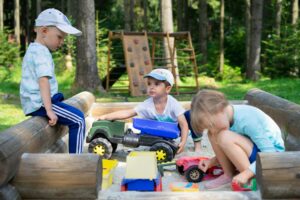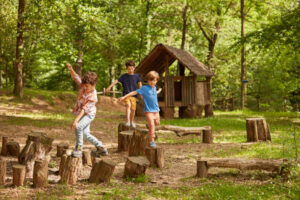Charities have warned that a lack of opportunity for outdoor play is seriously impacting children’s health and wellbeing.
 As MPs lead an inquiry into how better planning could enhance children’s health and wellbeing, charities urged them to prioritise the need for outdoor spaces for play, saying that this would help improve the physical and mental health of children and young people across the country.
As MPs lead an inquiry into how better planning could enhance children’s health and wellbeing, charities urged them to prioritise the need for outdoor spaces for play, saying that this would help improve the physical and mental health of children and young people across the country.
In addition, a recent poll conducted by the Institution of Occupational Safety and Health (IOSH) revealed that health and safety professionals believe that a lack of outdoor play is harming children’s ability to assess and manage risk.
Examining how the built environment can support children’s health
 The Levelling Up, Housing and Communities Committee is reviewing how better planning, building and urban design in England could enhance the health and wellbeing of children and young people, while also benefitting the population as a whole.
The Levelling Up, Housing and Communities Committee is reviewing how better planning, building and urban design in England could enhance the health and wellbeing of children and young people, while also benefitting the population as a whole.
The Children, young people and the built environment inquiry opened in November last year with the cross-party group of MPs examining how “children and young people can use outside public spaces and move around their neighbourhoods: how they can be active and visibly part of their communities.”
In its first evidence session last Wednesday (24th January 2024), the committee heard from witnesses on a range of topics relating to child development and the importance of a child-friendly built environment, as well as the role of outdoor play in supporting children’s health and wellbeing.
They also considered changes that have occurred in recent years to children’s lives outside and to their level of freedom and independence.
Improve children’s health with child-friendly neighbourhoods
Alice Ferguson, from parent and resident-led movement Playing Out, said that the lives of children and young people in England “have become incredibly restricted, indoors, isolated and inactive, largely due to changes in the outdoor environment.”
She added:
“Government could reverse this trend and hugely improve children’s health and wellbeing by making streets safer and neighbourhoods more child-friendly, enabling them to get outside and play every day.”
 The coalition of charities, which includes Playing Out, Save the Children UK and Wildlife and Countryside Link, argue that children want to be outside and active but that they face numerous barriers to being so.
The coalition of charities, which includes Playing Out, Save the Children UK and Wildlife and Countryside Link, argue that children want to be outside and active but that they face numerous barriers to being so.
The charities have pointed to other European countries, such as Germany, Norway and Sweden, who have relevant national policies or guidance to ensure cities are child-friendly.
They list cities such as Barcelona, Freiburg, Ghent, Paris, Pontevedra, Rotterdam and Tirana, which have all launched ambitious programmes for children’s health.
Children’s health inequalities are driven by poverty
The coalition said there was evidence that the physical and mental health of children and young people in this country was in serious, long-term decline and that this was significantly exacerbated by poverty.
In a statement, they said:
“Government policy has not addressed some of the root causes of this – and, in some cases, has added to the problem.
“A child-focused built environment policy could transform children’s lives, health and wellbeing […] effective, low-cost policies could be enacted almost immediately.”
Meanwhile, a recent report from the Royal College of Paediatrics and Child Health asserted that children’s health in the most disadvantaged communities presented “a terrifying picture”
The report, published in March 2023, stated:
“Health inequalities driven by poverty are growing dramatically, especially in children. Paediatricians are now seeing worsening health outcomes in areas such as oral health, nutrition, respiratory health, mental health and general wellbeing.”
‘No ballgames’ culture further restricts children
The charity coalition continued in their statement:
“For decades, public policy in England has failed to create places that support children’s healthy development and wellbeing.
“Traffic-dominated neighbourhoods, low quality housing layouts, inadequate facilities, and poorly designed housing estates, along with a lack of parks and green spaces and other accessible high quality natural spaces, have harmed children’s health and undermined their quality of life.
“Economic deprivation and racial inequality are both significant additional factors compounding children’s lack of access to outdoor play, physical activity and green space. There is also evidence to suggest girls spend less time outside playing than boys.”
The charities warn that the widespread use of policies such as “no ballgames” were further restricting children from being able to access free outdoor spaces for play.
They said:
“Children are also prevented or discouraged from using other ‘doorstep space’ – for example on housing estates – due to a lack of safe, accessible or suitable space and a lack of permission to use the space outside their homes.
“No ballgames signs and culture are still prevalent in social housing schemes across the UK.”
OSH professionals believe outdoor play is crucial for children
 Meanwhile, IOSH shared the charities’ report on LinkedIn and conducted a poll on the site asking users: “Do you think the lack of play opportunities could be harming children’s ability to assess risk?”
Meanwhile, IOSH shared the charities’ report on LinkedIn and conducted a poll on the site asking users: “Do you think the lack of play opportunities could be harming children’s ability to assess risk?”
The poll received over 900 responses, with a huge 95% saying ‘Yes.’
The comments from occupational safety and health (OSH) professionals responding to the poll clearly support the idea that outdoor play is crucial for helping children to learn how to develop their risk management skills.
One respondent agreed with calls to provide children with more opportunities for outdoor play, saying: “Children are natural born assessors, constantly and dynamically assessing their environment and surroundings.”
Another cautioned:
“A generation of kids engaging with others online and not in person will be a catastrophe for their overall development and future outcomes.”
Commenting on the poll results, IOSH Senior Policy and Public Affairs Manager Corey Edwards, said:
“Our members’ verdict has been clear: investment in play spaces would equip the children of today to become safer workers of tomorrow, enabling them to identify and address risks and prevent hazards.
“Local authorities should prioritise the creation of safe, child-friendly outdoor community spaces, and consider their inclusion throughout regeneration and housebuilding urban planning.”
Training and development to support children’s health and wellbeing
 First Response Training (FRT) is a leading national training provider delivering courses in subjects such as health and safety, first aid, fire safety, manual handling, food safety, mental health, health and social care, safeguarding and more.
First Response Training (FRT) is a leading national training provider delivering courses in subjects such as health and safety, first aid, fire safety, manual handling, food safety, mental health, health and social care, safeguarding and more.
They work with a large number of primary and secondary schools as well as early years and childcare providers, children’s playgrounds and children’s social care services.
Their courses include Health and Safety for Child Carers, Risk Assessment for Child Carers and Safeguarding of Children in Education.
They also deliver a range of training to help people support mental health and wellbeing and identify when individuals may be experiencing emotional and mental distress. These include Understanding Mental Health, Youth Mental Health First Aid, Anxiety Awareness, Self-Harm Awareness and Suicide Awareness.
A trainer from FRT says:
“It seems clear that children’s health and wellbeing can be boosted from having regular access to safe outdoor spaces for play. This will help their physical and mental development in numerous ways; it’s a key part of any childhood.
“A change in outdoor spaces and undue worries or misconceptions about risk management have conspired with advances in digital technology to lead children to live more indoor lives than they used to and the evidence suggests that this has not been a positive change for our young people.”
For more information on the training that FRT can provide, please call them today on freephone 0800 310 2300 or send an e-mail to info@firstresponsetraining.com.
